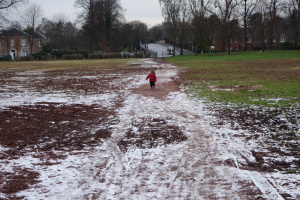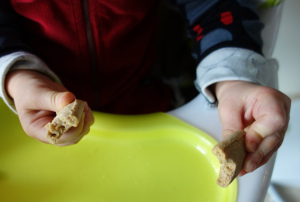All toddlers are crazy, but they aren’t all crazy in the same way (to paraphrase Tolstoy). I was at a friend’s house recently, thumbing through a book I would never otherwise have seen, and I came across a schema that basically told you what kind of crazy you could call your two year old. This pleased me to no end. First because I love schema. And secondly because I love it when somebody else carefully categorizes what I have managed only to observe unsystematically.
The book - La Leche League’s Mothering Multiples - outlines three distinct types of toddler, using a travel metaphor (you know how much I adore these): the sightseer, the wanderer and the trailblazer. It’s not rocket science, to be sure, but as I read it I suddenly saw so clearly the difference between my own twins, a difference I live the truth of on a daily basis.
Twins are particularly eye-opening, of course, when it comes to the idea of innate personality differences for a whole host of reasons. One of which is that our memory tends to fade - not to mention warp - between children in a way that is impossible when the children are existing, at the exact same age, side by side. My first two sons are chalk and cheese, as we say in the UK, but their idiosyncrasies as toddlers weren’t as stark to me coming consecutively. Nor did they feel so overwhelming.
I remember those six months Oliver refused to put his coat on without a wrestling match and the same six months Leo refused to go anywhere without clutching a Wiggles DVD in his hot little hand. I remember that Oliver was a preternaturally neat eater, except with yogurt which he would smear across the tray of his highchair in a frenzy that bordered on the demonic. I remember when Leo could not eat a meal without standing up and sitting down and standing up and sitting down. These memories, though, are only icebergs in a sea of years. The precise timeline of the events, the details of my own emotional response, the tacks taken successfully or not remain, for the most part, under water.
I see the idiosyncrasies of my current travelers, on the other hand, bright as bright can be. Not simply because they are happening right now. But because they are measured against each other - and, more difficultly, they intersect with each other - every single day. Because, in other words, they are happening in the context of twinhood.
Phoebe is a sightseer, through and through. These kids are observers by nature. They are routine-oriented and thrive on predictability: if it’s bath time, you need only say it once and up the stairs she marches, cooing for her rubber ducky. Sightseers are content to stick with the program, in this way, and by your side to boot. As a result, they take direction well because they don’t like anything that threatens their sense of safety. They aim to please, preferring to walk with you rather than away from you. Sightseers have episodes of rebellion, don’t get me wrong, but they are few and far between. When Phoebe doesn’t listen to me, I almost want to applaud her for summoning the gall.
When Jasper doesn’t listen to me, I want to tear my hair out. Because it happens over and over and over again. Don’t touch the TV, Jasper, don’t throw your food. It’s time for your bath, Jasper, yes it really is, we’ve only been having a bath at 7pm for 700 days in a row now. He is a wanderer, this boy, in mind and in body. I read the description of the wanderer twice over - the vaguest of the group by virtue of occupying a middle ground - to confirm where the line is drawn between this type and the trailblazer. To see if perhaps Jasper would have been a trailblazer in another life, had he been a singleton or a first or second child. He doesn’t have the frenetically high energy level, though, or the brazenness either. And thank goodness for that.
Wanderers, well, they wander. They aren’t forging new paths per se or bristling against every attempt at restraint the way their trailblazing counterparts do, but they aren’t necessarily cleaving to the ones you’ve carved out for them. Unlike the sightseer who has a focus that belies her age, the wanderer is distractible. He has the potential to concentrate, if a particular toy or game captures his fancy, but he is more likely to flit from one thing to the next. He is the child who will ‘forget’ the schedule, no matter how many times it has been laid down. He is adventurous and inquisitive, but not overly so. He will follow the rules, but only sometimes.
When you put the two types together - oh the joy of twins! - the results are interesting. The sightseer can inspire the wanderer to engage in longer periods of sustained activity. The wanderer can inspire the sightseer to leave her comfort zone. But the wanderer can also disrupt the meticulously designed world order of the sightseer and take glee in doing it: how many times a day does Jasper snatch one item, just one, from Phoebe’s perfectly arranged teddy bear picnic, sending her into a fit of hysteria? So too the sightseer, often rigid and exacting, can seek to control the wanderer and quash his spirit: how many times a day does Phoebe take on the mantle of parental responsibility, chastizing her brother (no, Japsie, no!) for some wrongdoing or other and causing him to lash out at her in return?
As with any two siblings, there is much negotiating to be done.
And yet, I find the travel metaphor especially apt for twins because they tend to walk, or be walked, a lot. Usually out of necessity. With two babies and one caregiver, the pram (or stroller) becomes quite literally a second pair of hands, a way to settle them both at the same time. When they were very small, I used to push my twins at least once a day through the streets and parks near our house, through whatever the uncooperative Scottish weather would throw at us. And now that they are older, they walk themselves through these same places. Phoebe right beside me, more often than not holding my hand. Jasper some stretch of distance away from us, having stopped to pick up a flower.



